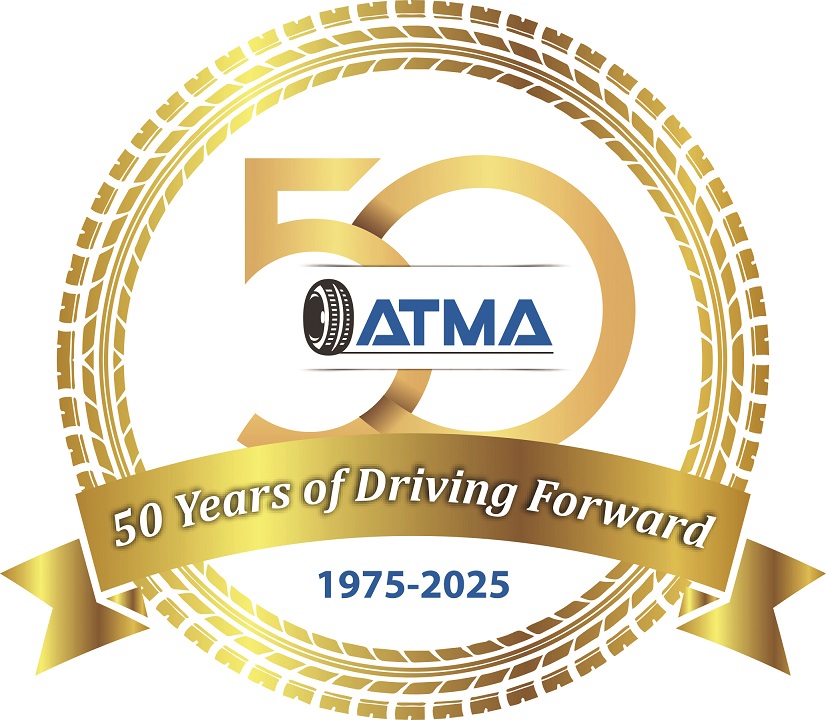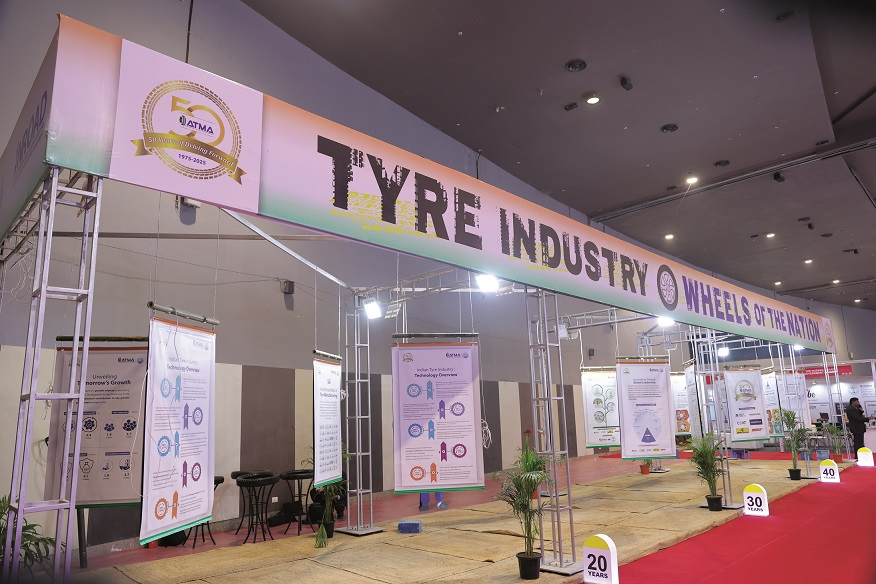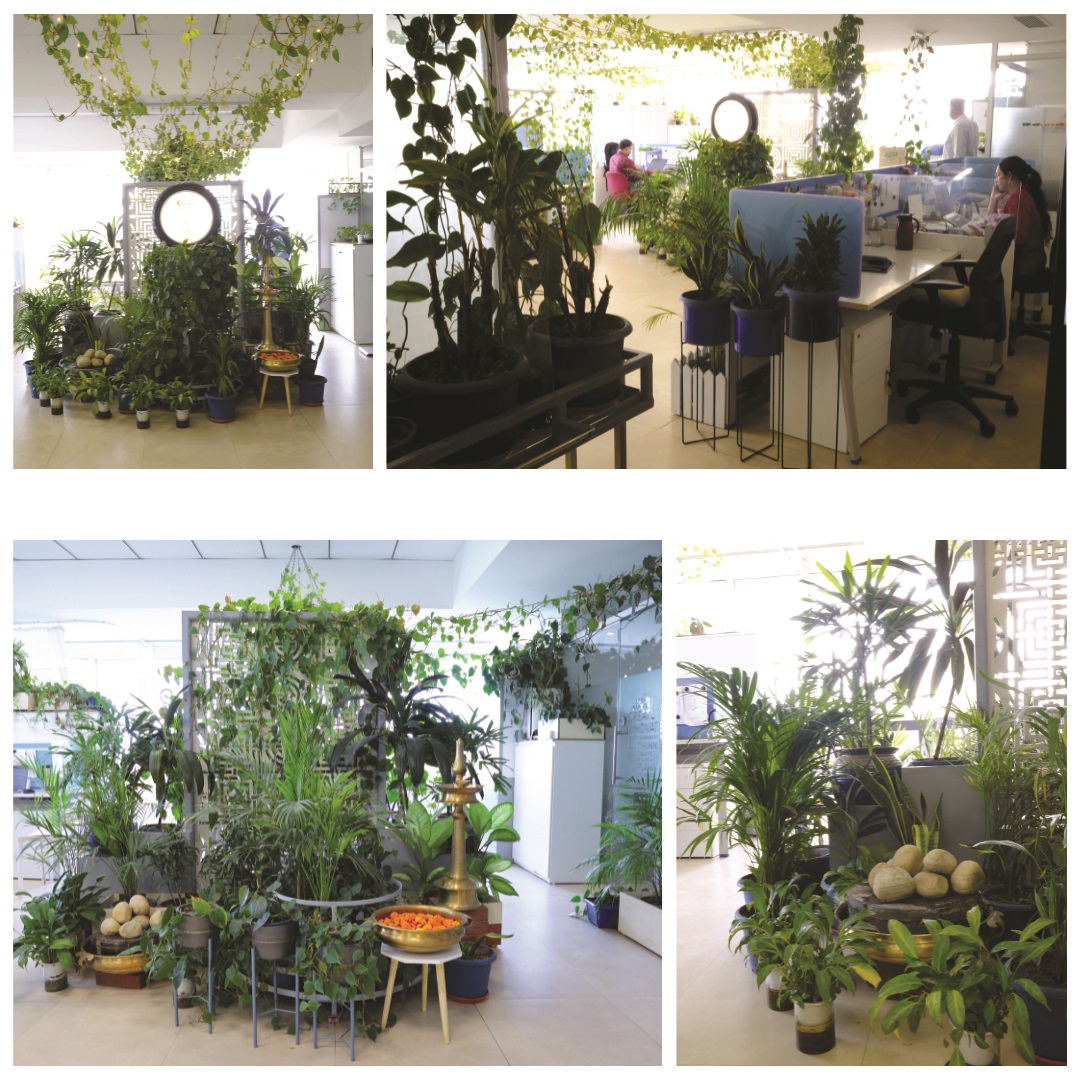ATMA Marks 50 Years As India’s Tyre Industry Drives Global Growth
- By TT News
- March 05, 2025

The Automotive Tyre Manufacturers’ Association (ATMA) has entered its Golden Jubilee year, celebrating five decades of fostering growth in India’s tyre sector and its pivotal role in the nation’s economic progress.
Established in 1975, ATMA has grown into the premier industry body representing over 90 percent of the country’s tyre production, solidifying its position as a cornerstone of India’s industrial landscape.
Over the past 50 years, the Indian tyre industry has achieved remarkable milestones in production, exports, research and development (R&D) and innovation, setting benchmarks for emerging sectors globally. Today, India ranks among the world’s largest tyre manufacturers, producing more than 200 million tyres annually.

The industry’s self-sufficiency is a standout achievement. India boasts indigenous capabilities to manufacture a wide range of tyres, from moped tyres to massive off-the-road (OTR) tyres – a feat few countries can match. This self-reliance has not only strengthened the domestic market but also positioned India as a major global exporter. Indian-made tyres are now shipped to over 170 countries, including stringent markets like US and Europe. Annual tyre exports are valued at approximately INR 250 billion, accounting for nearly 25 percent of the industry’s revenue.
The tyre industry’s impact on job creation is substantial, supporting a vast value chain that spans rubber planters, tyre mechanics, manufacturers and dealerships. It sustains over one million natural rubber (NR) planters, as 75 percent of India’s NR production is consumed by tyre manufacturing. An additional million workers are engaged in tyre production, retreading, dealerships and repair services nationwide.
A groundbreaking initiative, the INROAD project, exemplifies the industry’s commitment to self-reliance. In collaboration with the Rubber Board, the tyre industry is funding large-scale NR plantations in Northeast India. This partnership marks the first global instance of a natural rubber-consuming industry (the tyre sector) partnering with government agencies to fund NR cultivation, potentially transforming India’s journey towards NR self-sufficiency.
India’s tyre industry is increasingly aligning with global standards in practices, product quality and R&D. The country now houses some of the world’s most advanced radial tyre manufacturing facilities. International vehicle manufacturers (OEMs) are launching leading brands in India equipped with Indian-made tyres, underscoring the industry’s quality and competitiveness. Five Indian tyre companies are now ranked among the world’s top 30, reflecting the sector’s growing influence in the global manufacturing ecosystem.

India’s strengths in tyre manufacturing are undeniable. A combination of seasoned entrepreneurship, skilled manpower and robust NR plantations positions the country as a potential global hub for tyre production.
The recently concluded Bharat Mobility Global Expo highlighted the industry’s 50-year growth journey, showcasing its evolution into the ‘wheels of the nation’ through a series of banners arranged as a walkthrough.
Rajiv Budhraja, Director General ATMA, said, “I had the privilege of joining ATMA at a young age and have witnessed the growth of the industry from close quarters, especially after the economic liberalisation. It is gratifying to see the industry growing from a size of about INR 50 billion to INR 1,000 billion in the last three decades.”
“At this moment, I am full of gratitude to the industry leaders who have provided vision and direction to the industry and the association over all these years and to the untiring efforts of all those involved in the industry who have turned that vision into reality. Thanks are also due to publications like Tyre Trends (and its previous avatar of Tyre Asia) for chronicling this remarkable journey of the industry. Here’s to the unstoppable movement of wheels of the economy,” added Budhraja.
GREEN OFFICE, CLEANER FUTURE: HOW ATMA IS REIMAGINING WORKPLACE SUSTAINABILITY
In the heart of New Delhi’s bustling PHD House, ATMA is proving that office spaces can be more than just functional – they can be transformative environmental statements.
Under the leadership of Budhraja, ATMA has turned its headquarters into a verdant oasis that’s part workspace, part ecological experiment. The organisation has embraced a holistic approach to sustainability that goes beyond mere corporate rhetoric.

Not only do plants improve air quality by absorbing carbon dioxide and releasing oxygen, but they also have been shown to reduce stress and increase focus. “Thus was born the idea to have a green workspace so as to boost productivity, creativity and overall well-being”, said Budhraja.
The office is now a living, breathing ecosystem where every square foot serves a purpose. Lush greenery isn’t just decorative – it’s a strategic tool for improving air quality, reducing stress and boosting employee productivity.
ATMA has implemented energy-efficient lighting systems that dramatically reduce power consumption across their office space. The organisation’s architectural design features strategically placed open areas that maximise natural sunlight, reducing the need for artificial lighting during daytime hours.
By adopting a circular economy approach to waste management, ATMA transforms leftover food into nutrient-rich compost, which is then used to support the office’s green spaces, creating a closed-loop sustainability system.
The entire ATMA team is now actively engaged in maintaining this green space, turning sustainability from a corporate mandate into a shared cultural value.
It’s a small but significant step in an industry not typically associated with environmental innovation. By reimagining their workspace, ATMA is sending a powerful message: sustainability starts at home – or in this case, the office.
Sangwoo Ryu Named CEO Of Kraton Corporation
- By TT News
- February 07, 2026

Kraton Corporation, a leading global producer of speciality polymers and high-value bio-based chemicals derived from pine wood pulping co-products, has named Sangwoo Ryu as its new Chief Executive Officer. Ryu possesses over 25 years of leadership in finance and operations within international markets. He is currently the CEO of Cariflex Pte Ltd, a former Kraton spin-off now under DL Chemical, where he initially served as Chief Financial Officer starting in February 2020. He assumed the Cariflex CEO role in April 2025 following the promotion of its former CEO, Prakash Kolluri, to President of Kraton's Polymer business.
Ryu’s deep expertise in financial strategy, investment controls and operational planning is expected to strengthen Kraton’s standing as a reliable leader in global Pine Chemical and Polymers markets. In his new position, he will collaborate with Kraton’s Executive Leadership, Board of Directors and Cariflex Leadership to guide strategic decisions and operational excellence, reinforcing the company’s commitment to sustained growth and organisational stability.
Ryu said, “I want to express my gratitude towards the members of the Board of Directors and the Kraton Leadership Team for their unwavering dedication to Kraton’s success. I’m looking forward to leading Kraton into the next era of excellence, building upon the strong foundations and principles set forth in our vision and values.”
Industry Veteran Dieter Jerschl To Represent FORNNAX In Central Europe
- By TT News
- February 07, 2026

As part of its strategic growth into Central Europe, FORNNAX TECHNOLOGY, a global leader in recycling equipment manufacturing, has established a new sales partnership in Germany. The company has appointed industry veteran Dieter Jerschl as its representative for the region to drive the promotion and implementation of its recycling systems. Jerschl’s extensive expertise, built over two decades with prominent firms like BHS, Eldan and Vecoplan, encompasses a deep understanding of diverse waste streams such as tyre, cable, municipal solid waste and e-waste.
This collaboration, initially targeting Germany, Austria and adjacent countries, is designed to be flexible and scalable. Its primary aim is to cultivate a strong project pipeline and solidify FORNNAX’s regional footprint. The partnership extends beyond sales to include comprehensive technical support, with Jerschl’s team providing vital value-added services like installation, maintenance and spare parts assistance. This local service framework is intended to ensure efficient project execution, minimise operational downtime and elevate customer satisfaction.
By leveraging Jerschl’s profound market insight and established networks, FORNNAX seeks to accelerate the adoption of its high-performance shredding and pre-processing technologies. The move underscores the company’s global strategy of embedding local expertise within key markets, which it deems crucial for developing technically sound solutions tailored to specific regional waste challenges. This initiative reinforces FORNNAX’s dedication to innovation and environmental stewardship, advancing its mission to deliver sustainable recycling solutions worldwide.
Jerschl said, “I’ve known FORNNAX for over a decade and have followed their growth closely. What attracted me to this collaboration is their state-of-the-art technology; it is powerful, sustainable, and economically viable. There is great potential to introduce FORNNAX’s innovative systems to more markets across Europe, and I am excited to be part of that journey. We are committed to increasing market awareness and establishing new reference projects across the region. My goal is not only to generate business but to lay the foundation for long-term growth. Ideally, we aim to establish a dedicated FORNNAX legal entity or operational site in Germany over the next five to 10 years.”
Jignesh Kundaria, Director and CEO, FORNNAX, said, “We see tremendous potential in the Central European market. Partnering with someone as experienced and well established as Jerschl gives us a strong foothold and allows us to better serve our customers. This marks a major milestone in our efforts to promote reliable, efficient and future-ready recycling solutions globally.”
- KraussMaffei Extrusion
- Fernley H. Banbury Award
- Rubber Division of the American Chemical Society
- Sustainable Rubber Processing
- Global Polymer Summit
KraussMaffei’s Dr Gerard Nijman Earns Prestigious Fernley H. Banbury Award For 2026
- By TT News
- February 06, 2026

Dr Gerard Nijman of KraussMaffei Extrusion has been selected as the 2026 recipient of the prestigious Fernley H. Banbury Award, one of the rubber industry’s highest international honours, presented by the Rubber Division of the American Chemical Society (ACS). This award annually recognises outstanding scientific and technological contributions to the field.
The award commemorates the inventor of the internal mixer and highlights sustainable innovations in production technology, instrumentation, process control and the development of processing methods for rubber and similar materials. Dr Nijman’s career exemplifies such innovation, having significantly advanced rubber rheology, pioneered new mixing and multiplex extrusion technologies and modernised the production of silica compounds for the tyre industry.
His work has effectively bridged the gap between scientific research and industrial application. Notably, in the 1990s at Vredestein, he introduced novel mixing technologies and multiplex extrusion to tyre manufacturing. He also contributed to pioneering processes for silica compound processing, foundational to technologies like Michelin’s ‘Green Tyre’. Furthermore, his rheology-based designs for extruder screws and flow channels have helped shape enduring industrial standards.
Dr Nijman, who joined KraussMaffei Extrusion in 2017, brings decades of expertise from previous roles at Apollo Tyres Ltd and Vredestein Banden BV. His ongoing collaborations with the German Institute for Rubber Technology (DIK) and the University of Twente have also profoundly influenced his approach. KraussMaffei Extrusion itself is globally recognised for its tyre technology, building on longstanding Berstorff expertise to deliver advanced extrusion solutions for treads, sidewalls, innerliners and other components, as well as high-performance multiplex and calender systems.
The award acknowledges not only his specific technical achievements but also his distinguished career and lasting impact on rubber processing. The official presentation will be held in September 2026 during the Global Polymer Summit in Louisville, Kentucky, US.
Dr Nijman said, “It is a great honour for me to receive the Fernley H. Banbury Award. This recognition confirms the importance of the close connection between research and industrial practice in rubber processing and motivates me to continue to drive forward innovative solutions for our industry.”
Ralf Benack, Managing Director, KraussMaffei Extrusion, said, "We warmly congratulate Dr Nijman on this outstanding award. With his in-depth knowledge, many years of experience and tireless dedication, he has had a decisive influence on the rubber and tyre industry and has further developed our technologies in a targeted manner. This recognition is more than deserved. We are very proud to have Dr Nijman in our team!"
Michelin Appoints James Dimmock As Commercial Communications Manager For UK And Ireland
- By TT News
- February 05, 2026

Michelin has appointed James Dimmock as its new Commercial Communications Manager for the United Kingdom and the Republic of Ireland. Based at the company's Stoke-on-Trent headquarters, he will report to the Northern European Communications team. In this capacity, Dimmock will oversee all commercial communications, including public relations, social media and influencer partnerships.
His mandate involves crafting the brand's commercial narrative, fostering stronger connections with media and content creators and producing innovative digital content to support the brand's growth. He brings more than two decades of extensive experience with Michelin to the role, having held various senior marketing and communications positions both internationally and domestically. His most recent role was as Social Media and Influencer Manager. He will now lead these efforts locally while integrating with the broader communications team.
John Howe, Managing Director, Michelin UK, said, “James has already made a significant contribution to Michelin communications activity in the UK & ROI. His deep understanding of our business and products, combined with his strategic and creative approach, makes him ideally placed to lead our commercial communications as we continue to evolve our brand.”
Dimmock said, “I am excited to be taking on this new role at Michelin. It is a privilege to continue building on the work we have already achieved and to help drive the next phase of our commercial communications strategy across the UK & ROI.”







Comments (0)
ADD COMMENT